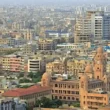As monsoon winds are set to sweep into Sindh from August 16, Karachi is on high alert for the possibility of rain from August 17 to 19. Chief Meteorologist Sardar Sarfaraz, in a conversation with Geo News, stated that the city could experience mostly moderate rain with thundershowers, and heavy rain is likely in some areas.
Monsoon Arrives in Karachi
The Pakistan Meteorological Department (PMD) has already observed light rain at various locations in Karachi early this morning. The forecast for the next 24 hours predicts overcast skies with a chance of drizzle and light rain. The minimum temperature in Karachi was recorded at 28°C, while the maximum is expected to range between 30°C and 32°C. Westerly winds are blowing at 13 km per hour, with humidity levels recorded at 85%.
This weather pattern is expected to continue as the monsoon winds, entering lower Sindh, bring more rainfall to the region. The PMD anticipates similar weather conditions in other parts of Sindh, including Hyderabad, Thatta, and Badin. Rainfall is also expected in various regions across the country, including Islamabad, with the potential for downpours in some locations.
Urban Flooding Concerns
In light of the expected heavy rains, the National Disaster Management Authority (NDMA) has issued a warning about the potential for urban flooding in Karachi and other parts of the country. The NDMA has called on local authorities and citizens to prepare for the possibility of flash floods and landslides, particularly in hilly areas and regions with already high water levels.
The National Emergency Operations Center (NEOC) has specifically identified the catchment areas of the Neelum and Jhelum rivers in Azad Jammu and Kashmir as being at risk for isolated heavy rains. Additionally, several districts in Balochistan, including Barkhan, Bolan, Harnai, Jaffarabad, Kohlu, Musakhel, Nasirabad, Sherani, Sibi, and Zhob, are also on high alert. In Sindh, areas such as Mirpur Khas, Dadu, Jacobabad, Khairpur, Larkana, Mithi, Matiari, Sanghar, and Sukkur are expected to experience significant rainfall.
Preparedness and Response
The NDMA’s warning follows a series of recent rains that have already resulted in 178 fatalities across Pakistan since July, with 92 of those deaths being children. The collapse of homes due to heavy rainfall has been the leading cause of these fatalities. The anticipated downpour could exacerbate the situation, leading to more urban flooding in major cities and an increase in water levels in streams and nullahs, which may trigger flash floods.
In response, the NDMA has directed all relevant departments to mobilize emergency response teams and ensure that resources are in place to respond swiftly to any arising emergencies. The government body is urging the public to take necessary precautions and avoid unnecessary travel, particularly to areas identified as high-risk zones.
Tourists have been specifically advised to refrain from visiting regions prone to flooding and landslides during this period. The NDMA’s proactive measures are aimed at minimizing the potential impact of the monsoon rains, but the situation remains fluid as the weather system continues to develop.
As Karachi and other parts of Sindh brace for the upcoming monsoon rains, authorities are on high alert to manage the potential risks associated with heavy downpours. The NDMA’s warnings of urban flooding and landslides highlight the seriousness of the situation. Citizens are urged to stay informed, take necessary precautions, and cooperate with local authorities to ensure safety during this challenging weather period. The coming days will be critical as the city navigates through the monsoon season with hopes of minimizing damage and ensuring the safety of its residents.











